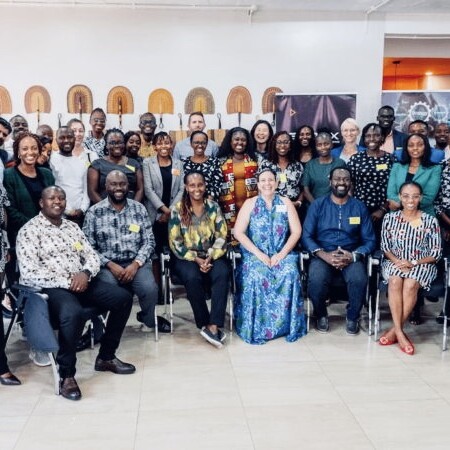However they come into being, networks typically have to grapple at some point with the circumstances of their legal registration. This may take place at the outset of a network’s establishment or even years down the road when the situation has changed and whatever arrangement has been in place is no longer serving the network and its members.
We can articulate a set of three broad options for legal arrangements for networks alongside some of the considerations and risks related to each.

The network as a legal entity
The first option is that the network registers as a legal entity. In this scenario, the network will be its own organization. It will have legal standing and tax-exempt status (if registered as a nonprofit, charity, or non-governmental organization), and will adhere to the local laws as well as local rules and procedures for regular reporting, etc. Establishing your network as a nonprofit will likely require establishing a board that will have legal and fiduciary responsibility for the organization. This then requires ensuring the management of the board and following legal requirements for reporting.
The registration process to become a legal entity varies from place to place both in name and in terms of legal conditions and requirements. Your network will have to choose a local jurisdiction in which to register. For a network that spans multiple jurisdictions — whether localities, states/provinces, or even countries for a global network — this may necessitate research to understand differing requirements and conditions. You’ll need to size up options to determine which will be the best match for your network both now and into the future. The final decision should of course be a collaborative one made by network members.
One risk to watch out for is the self-perpetuation that establishing an organization can entail. Fully-fledged organizations must be maintained and may default to a focus on survival first and foremost to, for example, cover the inevitable operating costs that a legal entity entails. These realities may contradict a network’s need or desire to be more adaptive in response to its mission and members. This could, for example, result in the network becoming program-driven rather than member-driven by taking on funded projects to sustain itself rather than following the will of its members.
A hosted network
A large number of networks are hosted by other organizations. This can take a wide variety of forms, from an organization that establishes a network itself to a network that finds a home with a member or other friendly organization or, for that matter, multiple organizations.
A hosted network is not registered as a legal entity and instead benefits from the legal status of another organization that agrees to host the network. The network relies on the host to receive, disburse, and account for any network funding, using its financial and accounting systems and capacity to do so. This is the crux of the hosting relationship — that the host ensures basic legal and financial management for the network given that an unregistered network can’t open a bank account or sign legal agreements. The host organization may fulfill certain other services for the network such as hiring network staff, utilizing their human resources, IT, and other support services and systems, and potentially hosting those staff in the organization’s offices. A hosted network can even have multiple hosts — more than one organization that receives and channels funds on behalf of the network and hires staff who manage it.
Hosting can be an incredible opportunity for networks who are unable or uninterested in establishing themselves as their own legal entities. At the same time, there are a number of implications for hosting the network that should be acknowledged. One may be quite practical: a host that manages a network’s finances will typically retain some amount of those funds to cover the costs of their administrative services. How this is determined and what this looks like will be circumstance- and context-specific.
Additionally, the host will hold legal and fiduciary responsibility for the network which means any related decisions concerning the network must ultimately be deferred to the organization’s staff. This can have strategic and operational implications for the network. For example, while a hosted network may have a governing body such as a steering committee, that body will have no legal rights (or responsibilities) to define the direction of the network or make decisions on its behalf. Any capacity to do so will be at the behest of the host organization to allow or foster more collaborative decision-making. Similarly, should the host decide to fire a network staff member, it will have every legal right to do so without the cooperation, or in some cases even the knowledge, of the governing body or other network stakeholders (other staff or members). Likewise, a host organization that is also a network member might expect a privileged role within the network or attempt to exercise undue influence over network staff, the governing body, members, or certain activities.
In many ways, if the host organization chooses to harness its position as host to its own benefit, it can impact network dynamics including how much the network stays member-driven, how the network operates, how much the network’s staff are given the latitude to work for the network rather than for the host organization, and more. Without legal standing, anyone representing the network will ultimately rely on the goodwill of the host organization to fulfill the needs of the network and have its best interest — as defined by its members — front and center at all times.
At the same time, despite the risks, hosting is a solid option for most networks and can bring huge benefits to the network. A hosting arrangement can open up opportunities for funding and staffing that unregistered networks can’t access, allowing them to grow, develop, and create ever-greater impacts. A good, supportive host will greatly bolster the potential of the network.
A fiscally sponsored network
A final option is to have the network hosted by a fiscal sponsor. Fiscal sponsorship is a formal arrangement between a nonprofit and, in this case, a network. A fiscal sponsor is an organization explicitly established to receive charitable contributions for specific projects (or networks in this case)[1]. Fiscal sponsors are entities with tax-exempt status, which then extends to the network. As with a host, the fiscal sponsor ensures legal and financial management, channels network funds, and can hire any network staff.
There is some overlap between a hosted and a fiscally sponsored network — the difference lies in the fiscal sponsor being explicitly such and not a member organization or other stakeholder of the network. In many ways, a host organization is a nonprofit that engages in fiscal sponsorship to host a network while a fiscal sponsor’s reason for being is to channel funding — while ensuring oversight and compliance — to projects that are implemented at the discretion of the project’s leaders which in this case is the network, its staff, governing body, and members. As such, the fiscal sponsor provides the legal and administrative “home” for the network while (presumably) avoiding any undue influence or conflict of interest that may arise with a hosting arrangement.
The most relevant path for your network
Networks are highly diverse, and the most relevant legal arrangement should be grounded in the network’s distinct development path and unique needs. A key principle to work from in defining the most appropriate arrangement is that no single person or organization can realistically own a network — they must be owned and led by the membership or will fail to achieve the value of the unique operating model they embody. Keeping this principle in mind, your network will need to determine the right set of circumstances that will maximize the opportunities while minimizing or mitigating the risks.
[1] https://www.fiscalsponsors.org/about-fiscal-sponsorship

Kerstin Tebbe, Founder, Collective Mind : Kerstin founded Collective Mind in late 2019 after many years of independent study and research on networks. With Collective Mind, she has supported networks from local to global on a wide range of challenges including strategy development, network assessment and evaluation, design and organizational review, convening, fundraising, capacity building, and network strengthening. Kerstin has lived and worked in New York, Buenos Aires, Paris, Nairobi, Geneva, and Washington DC. When she’s not thinking about networks, she’s dancing.
originally published at Collective Mind
featured image found HERE

Network Weaver is dedicated to offering free content to all – in support of equity, justice and transformation for all.
We appreciate your support!



